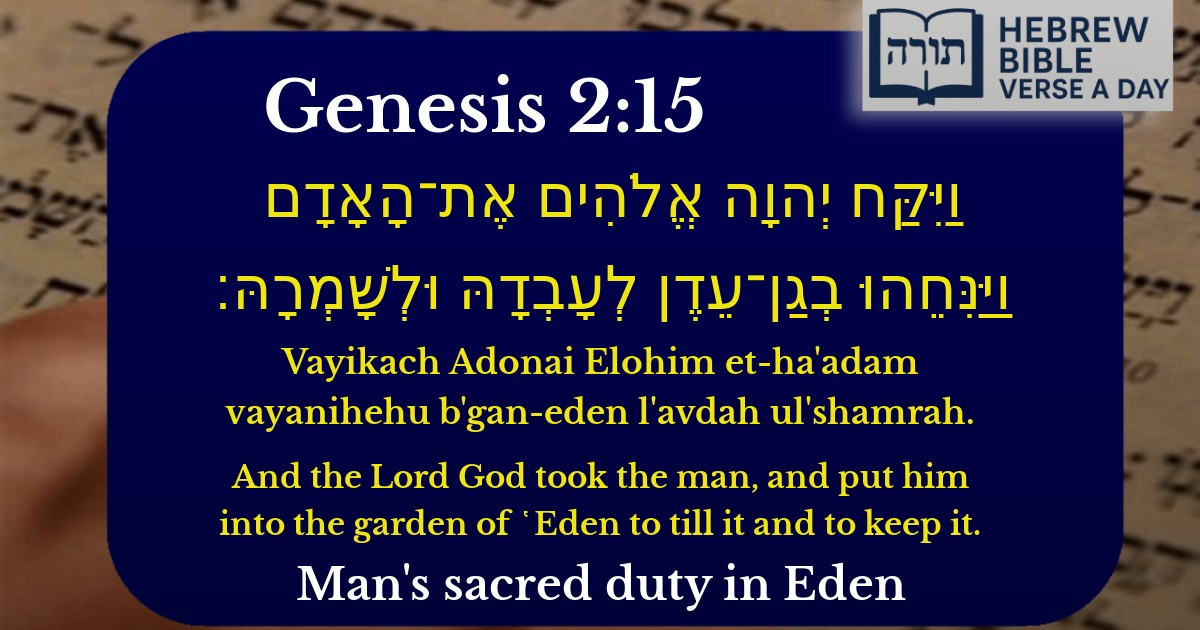Join Our Newsletter To Be Informed When New Videos Are Posted
Join the thousands of fellow Studends who rely on our videos to learn how to read the bible in Hebrew for free!
Hebrew Text
וַיִּקַּח יְהוָה אֱלֹהִים אֶת־הָאָדָם וַיַּנִּחֵהוּ בְגַן־עֵדֶן לְעָבְדָהּ וּלְשָׁמְרָהּ׃
English Translation
And the Lord God took the man, and put him into the garden of ῾Eden to till it and to keep it.
Transliteration
Vayikach Adonai Elohim et-ha'adam vayanihehu b'gan-eden l'avdah ul'shamrah.
Hebrew Leining Text
וַיִּקַּ֛ח יְהֹוָ֥ה אֱלֹהִ֖ים אֶת־הָֽאָדָ֑ם וַיַּנִּחֵ֣הוּ בְגַן־עֵ֔דֶן לְעׇבְדָ֖הּ וּלְשׇׁמְרָֽהּ׃
וַיִּקַּ֛ח יְהֹוָ֥ה אֱלֹהִ֖ים אֶת־הָֽאָדָ֑ם וַיַּנִּחֵ֣הוּ בְגַן־עֵ֔דֶן לְעׇבְדָ֖הּ וּלְשׇׁמְרָֽהּ׃
🎵 Listen to leining
Parasha Commentary
📚 Talmud Citations
This verse is quoted in the Talmud.
📖 Sanhedrin 56b
The verse is cited in the discussion of the Noachide laws, particularly regarding the commandment to establish courts of justice, which is derived from the phrase 'to till it and to keep it.'
📖 Avodah Zarah 8a
The verse is referenced in the context of discussing the origins of human labor and divine commandments related to work and stewardship of the earth.


Overview of the Verse
The verse (Bereishit 2:15) describes Hashem placing Adam in Gan Eden with a dual purpose: "לְעָבְדָהּ וּלְשָׁמְרָהּ" ("to till it and to keep it"). This directive establishes humanity's role in the world—both physical labor (avodah) and spiritual guardianship (shemirah).
Rashi's Explanation
Rashi interprets "לְעָבְדָהּ" as referring to agricultural work—tending to the garden's needs—while "וּלְשָׁמְרָהּ" means safeguarding the garden from harm or misuse. He emphasizes that Adam's labor was not burdensome but purposeful, aligning with the natural harmony of creation before the sin.
Rambam's Perspective
In Moreh Nevuchim (1:2), Rambam suggests that Adam's role in Gan Eden symbolizes humanity's intellectual and spiritual mission. The garden represents the ideal state where one cultivates wisdom (avodah) while adhering to divine commandments (shemirah). The physical act of tending the garden parallels the soul's duty to refine the world.
Midrashic Insights
Kabbalistic Interpretation (Zohar)
The Zohar (Bereishit 27a) associates "לְעָבְדָהּ" with elevating the sparks of holiness in creation (birur nitzotzot) and "וּלְשָׁמְרָהּ" with maintaining boundaries (seder ha'olam). Adam's role was to unify the spiritual and material realms through divine service.
Halachic Implications
The Talmud (Sanhedrin 56b) derives the Sheva Mitzvot Bnei Noach (Noahide Laws) from this verse, teaching that humanity's basic ethical and spiritual obligations originate in Gan Eden. The phrase "לְעָבְדָהּ וּלְשָׁמְרָהּ" thus serves as a foundation for universal divine service.